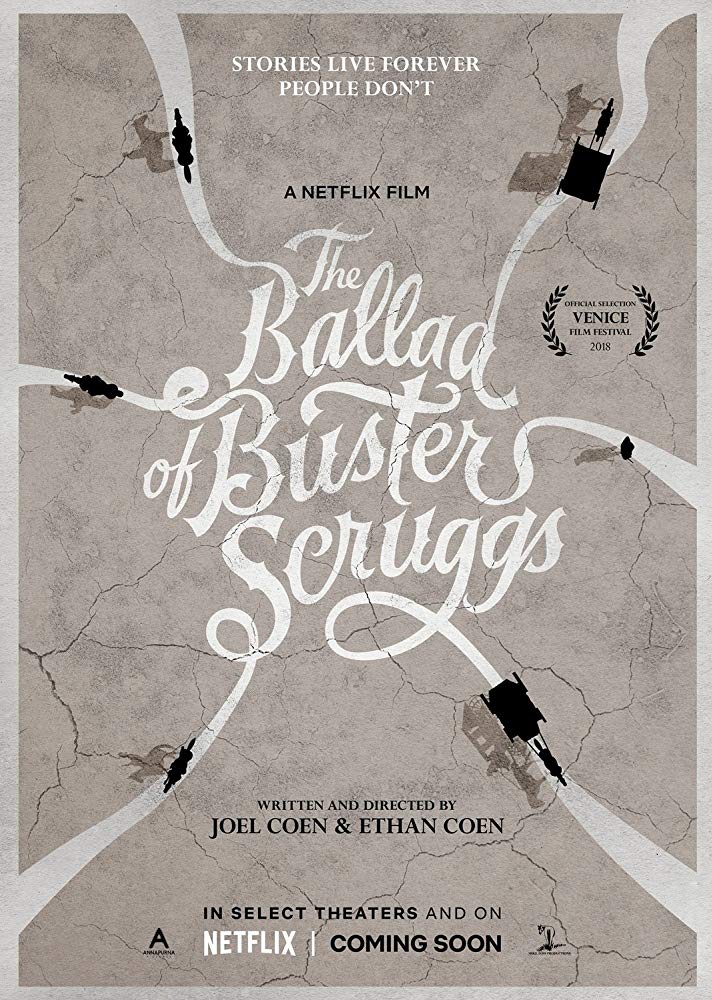Pardners, y’all may or may not be aware of this, but I’m one of those heathen souls that didn’t care for True Grit. The Coen Brothers remake, that is. Loved the book, love the original film, and normally I cozy right up to the Coens’ signature surrealistic stylings. True Grit being a quirky story in its own right seemed like a natural fit, but… well, I’ll let 2011 me explain if you feel the notion. The best way I would describe it now would probably be that, being familiar with the pre-existing material, I was highly aware of the particular Coen spin upon it and it was just too dang much. “Seeing the wires,” as it were.
But that’s then, and this is 2018, and it turns out the Coens weren’t done with the Western genre just yet. Nossir, not by a long shot. The Ballad of Buster Scruggs, now available on Netflix for your viewing enjoyment, represents their explicit return West of the Mississip and South of the Twentieth Century, and it is a charming and disarming effort that at long last has provided me everything I might have hoped for in a confluence of Coens and Cowboys.
What’s the difference? Well, for one thing–and I had no notion of this going in–it turns out that this film is actually six films in one. An anthology of tales that are unrelated save for their particular time and place in the American Old West, much like the big collection of Zane Grey that sits on my bookshelf, and in fact presented exactly as if they were short stories in an oversized prestige edition, illustrated bookplates, frosted separator pages and all. If you’re old enough to remember such affairs (or perhaps at least have run across one in your local library or family home), the nostalgia will hit you hard before Tim Blake Nelson has sung his first horseback stanza.
Yes, only the first tale features the titular singin’ cowpoke Buster Scruggs, and unfortunately I suppose it’s a bit of a spoiler to say, since I managed to not know and because of that was rather intrigued by outcome. Following on are five more vignettes of varying tone and theme which run the gamut not only of the Western genre’s storytelling potential but the various moods and fringes of the Coens as well, where you might be pleasantly reminded how the same men who brought you Raising Arizona also brought you No Country for Old Men.
That was my reaction, anyhow. I would contend none of the stories presented would be capable of holding up a feature film in their own right, but as short subjects they are right at home, and neither they nor the Coen stylings they feature overstayed their welcome. “Meal Ticket” was the story that perhaps most threatened to become tedious for me, but was also paradoxically the most emotional for me when it hit its marks, and when its abrupt ending finally came it left me feeling almost guilty instead of relieved.
Anyhow, if you’re a fan of the Coens, the Western genre, or both, there’s something in Buster Scruggs you’re going to like, and I believe that’s true even if their most recent cinematic efforts haven’t given you quite the thrill you used to experience. It makes me want to see the Coens do more collections like this, but exploring different genres every time: pulp horror, perhaps, or fairy tales. But in the meantime I’ll be selfishly happy it was the Westerns that got the nod, here. Recommend.









One thought on “The Ballad: Boom, or Buster?”
Evervigilant
I loved Buster Scruggs. I think that first story could support a feature film. The rest were good as short stories. I was impressed with the talented actors, and how much the effort gave for the short stories they were in. I truly miss good westerns.
Comments are closed.